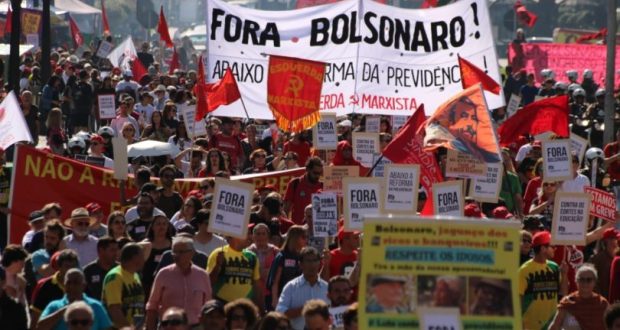The general strike of 14 June saw the participation of important sectors of the working class that have a tradition of organisation, such as metallurgical workers, chemical workers, oil workers, bank employees, public servants, etc. But the strike could have been stronger, with even larger demonstrations, if the union leadership had actually mobilised their base.
Read the original in Portuguese at Esquerda Marxista |
Two days before the strike, the president of the CUT, Vagner Freitas, declared that "this Friday, 14 July, is not a day to go to work, it is a day to stay at home." That is, instead of telling the workers to go to the streets, form pickets at their workplaces, or participate in the demonstrations, the president of the largest trade union in the country directed a "pyjama strike". Despite this, significant demonstrations took place throughout the country, although minor in relation to those of 15 and 30 May. It is also important to highlight that police repression was used again in some places, such as São Paulo, Rio de Janeiro and Porto Alegre.
The judiciary regarded the strike in some sections to be illegal, and acted accordingly, arguing that the action had a "political character". This is an absurd decision, which represents an attack on the right to strike and freedom of association. But this also revealed the political cowardice of union leaders who resolved to cancel strike action due to blackmail from the judiciary, instead of facing them by redoubling the mobilisation of the rank-and-file, and calling for class solidarity.
This was the case for the unions representing the railways of São Paulo (CPTM), who organised the suspension of the previously approved strike the day before. The Rodoviarios do ABC Union (representing bus drivers) actively removed a picket that sought to prevent the departure of buses in the morning of 14 July in São Bernardo do Campo. In Rio de Janeiro, the Union of Drivers announced that the decision to strike would be down to each driver. It is clear that, faced with the probable political persecution of isolated workers by the bosses, the buses functioned normally, as well as the metro in the city. Other cases like these were reported throughout the country. Different labour unions did not even visit the workplaces of their members to explain the situation and the significance of the pension reform bill. They did not try to organise the strike.
Radicalism from below, cowardice at the top
But the general strike demonstrated once again the disposition of young people and workers in the current struggle. 14 July could have been a decisive chapter in burying the counter-reform to pensions and the Bolsonaro government along with it. It was a day of struggle that had an impact, but the union leaders blocked a strong and decisive blow.
The instability of the government continues to deepen. In less than six months of his presidency, Bolsonaro has fired a third minister (Government Secretary Santos Cruz), as part of the conflict between the military wing and the followers of Olavo de Carvalho inside the government. One of the pillars of credibility for Bolsonaro, the former judge Sérgio Moro continues to be demoralised by the damning details of his collusion with Lula’s prosecution in the Car Wash scandal, as revealed by The Intercept Brazil. Joaquim Levy, who held positions in the Cardoso, Lula and Dilma governments, and who is a staunch advocate of the financial markets, resigned as president of BNDES (Brazilian Development Bank) after Bolsonaro said that he was "big-headed".
The disputes between the government and Congress continue to intensify. Bolsonaro, the wannabe Bonapartist, is failing to secure his image as a strong ruler, standing above all other classes and powers. The Legislature seeks to react and gain greater political prominence. The version of the pension reform bill presented by the special commission to the Congress took out the heart of the project proposed by the government: the end of the public and welfare provision and the implementation of a regime of capitalisation (i.e. switching from a public fund to individual, private schemes). This reveals, on the one hand, the fear of the bourgeois representatives of approving a brutal attack like the capitalisation – even more so after the last demonstrations – and on the other hand, it is also a way to look for a differentiation between the 'parliament's' proposal, and the 'government' project. In any case, the struggle must continue for the total withdrawal of the project, which retains deep attacks in the form of an increased number of minimum working years, increased retirement age, etc. Additionally, the points removed can be resubmitted as amendments, or as new bills. Therefore, the next step should be to prepare a general strike for an indefinite period to bury the entire Pension Reform project, reverse the cuts in education and overthrow Bolsonaro.
Despite all this, the leadership of the trade unions and parties like PT, PCdoB and PSOL, continue to try to block the struggle for "Fora Bolsonaro" (Bolsonaro Out). They try to stifle that call in the demonstrations. This was seen on 30 May and once again on 14 June.
The strength of the movement of the working class can override these conciliatory leaders, whose line can only lead to defeats. A new leadership must be forged that represents the immediate and historical interests of workers and youth. This is the fight of Esquerda Marxista.

